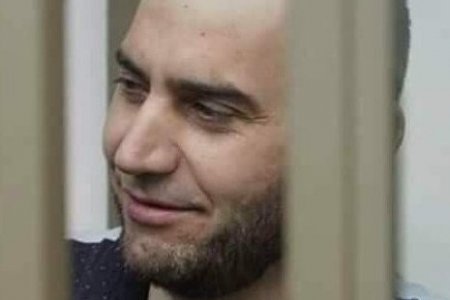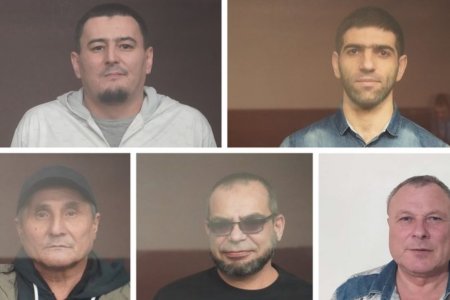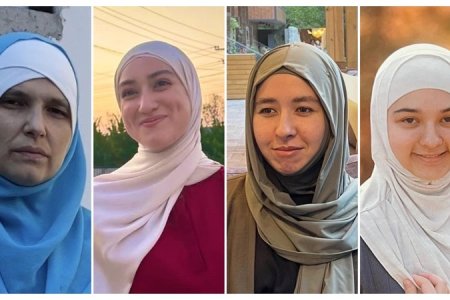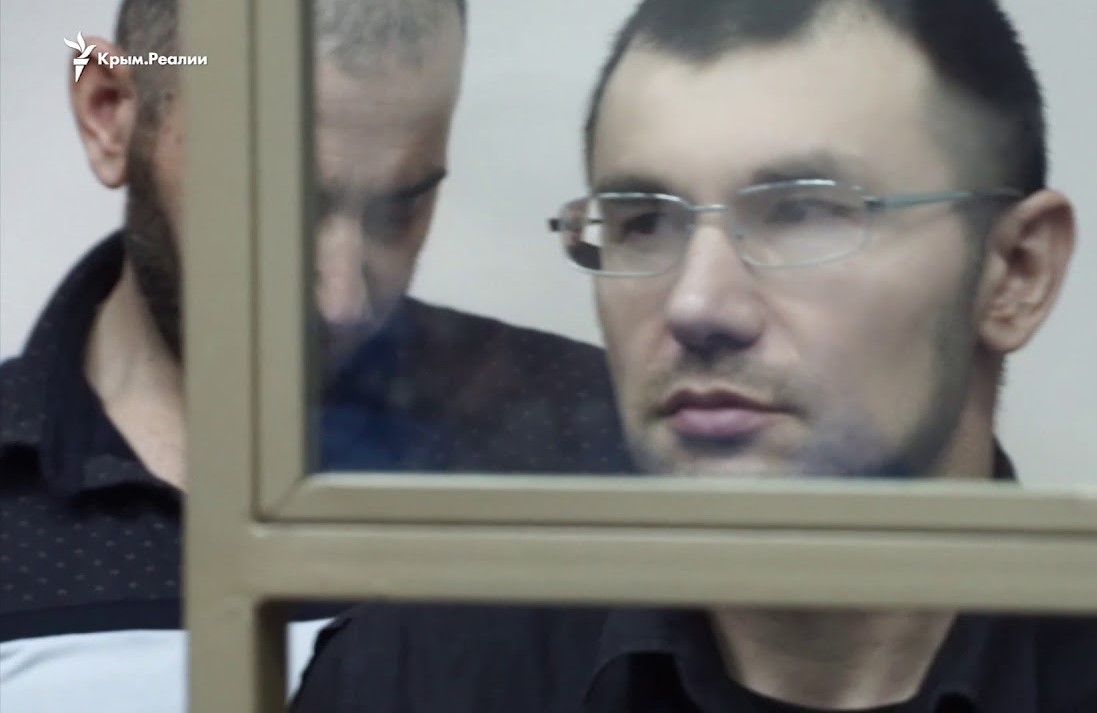
Emir-Usein Kuku, was taken to a Russian hospital in the early hours of 21 June, with his wife able to find out only that he was suffering acute pain in the kidneys. The Crimean Tatar human rights defender and recognized prisoner of conscience has faced chronic kidney problems since he was savagely beaten after an apparent attempt to abduct him went wrong and turned into an armed FSB ‘search and interrogation’.
Meriem Kuku told the Crimean Solidarity human rights initiative that she had tried all three available numbers to get through to the prison colony where her husband is held, yet nobody answered. It was only after she succeeded in contacting the public monitoring group for Bashkortostan (Bashkiria), that the head of the monitoring group was able to contact the prison. He was told that Kuku had been hospitalized in acute pain at around 5 a.m. on 21 June, but not which hospital (the city hospital, or one run by the penal service).
Kuku will be turning 47 on 26 June 2023, his seventh year in Russian captivity. The son of a veteran of the Crimean Tatar national movement, he had felt unable to remain silent in the face of the ever-mounting number of enforced disappearances, armed searches and politically motivated arrests that Russia had brought with its invasion and annexation of Crimea. He joined the Crimean Contact Group for Human Rights and was responsible for monitoring human rights violations in the Yalta region.
There are strong grounds for suspecting that Kuku might have become the latest victim of enforced disappearances on 20 April 2015 had he not succeeded in attracting public attention to an assault in broad daylight and likely planned abduction. Kuku’s cries for help as he was being beaten, including around the kidneys, by his two assailants, led to a crowd appearing. It was only then that these apparent thugs claimed to be police, and that a van arrived with armed and masked men who ordered the crowd to disperse and took Kuku away. Kuku later recounted how the men also beat him during this car journey and consulted, by telephone, with somebody, as they were clearly worried about the attention the incident had attracted. After this consultation, they announced that they were going to carry out a search of his home. That search took place in the presence of Alexander Kompaneitsev, the Ukrainian traitor turned FSB officer, who was to later play a key role in the ‘terrorism’ charges used to imprison Kuku and five other Ukrainian Muslims. Kuku posted photos of the injuries he received from this ‘FSB search’ and also demanded an investigation into the treatment he had received (see When Abduction Turns to FSB ’Search’ in Russian-occupied Crimea).
Neither then, nor on 3 December 2015, when charges against him were announced under Russia’s notorious ‘extremism’ legislation over Facebook posts, was there any suggestion of the charges later used to sentence him to 12 years.
It had been clear since April 2015 that Kuku was being targeted because of his human rights activism, and it is no accident that it was the especially brutal and gratuitously violent arrests on 11 February 2016 of Emir-Usein Kuku; Muslim Aliev; Inver Bekirov and Vadym Siruk, as well as two much younger men – Refat Alimov and Arsen Dzhepparov, that led to the emergence of the Crimean Solidarity human rights movement. Kuku was the first of very many Crimean Tatar civic activists or journalists to face spurious ‘terrorism’ charges, based solely on claims of involvement in Hizb ut-Tahrir. This peaceful, transnational Muslim organization is legal in Ukraine and most other countries, and Russia’s Supreme Court has never explained why it declared Hizb ut-Tahrir ‘terrorist’ in 2003.
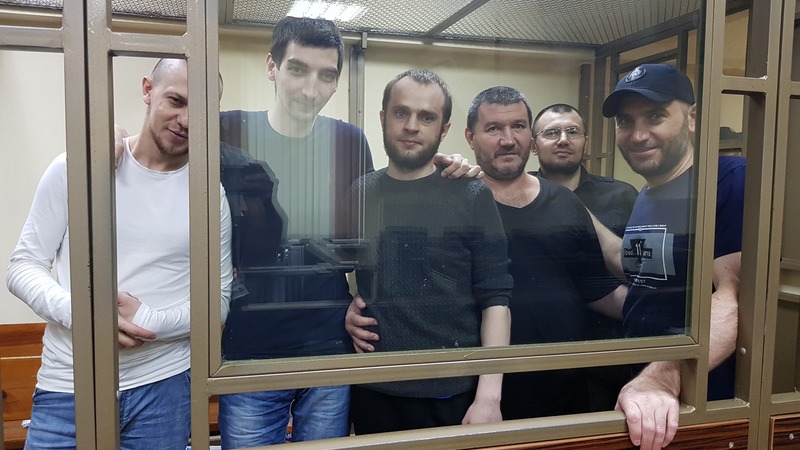
Two of the men: Muslim Aliev and Inver Bekirov were designated the role of ‘organizer’ of an entirely unproven Hizb ut-Tahrir ‘cell’, under Article 205.5 § 1 of Russia’s criminal code. The other four men were accused of ‘involvement in this ‘cell’ under Article 205.5 § 2. Later, all six men were also charged with ‘‘planning to violently seize power’ under Article 278.
The ‘trial’ was profoundly flawed, with the only ‘evidence’ coming from fake FSB-loyal ‘experts’ and anonymous witnesses. This, however, was a political trial, with ‘judges’ Roman Viktorovich Saprunov; Dmitry Viktorovich Merkulov and Roman Vladimirovich Podolsky (from the Southern District Military Court in Rostov providing the six guilty verdicts required of them. These were, on 25 June 2020, upheld by Oleg Aleksandrovich Yegorov; Aleksander Aleksandrovich Mordovin and Anatoly Valentinovich Solin. Despite having committed no crime, Muslim Aliev and Inver Bekirov were sentenced to 19 years; Emir-Usein Kuku and Vadim Siruk to 12 years; Refat Alimov to 8 years and Arsen Dzhepparov to 7 years. All of the sentences were to be served in the harshest of Russian prison colonies, with the men held thousands of kilometres from their families in Crimea.
All six men were recognized by the Memorial Human Rights Centre as political prisoners and by Amnesty International as prisoners of conscience. Their release has been constantly demanded by international bodies and democratic states, yet only Arsen Dzhepparov is finally home with his wife and daughter, and this only because he served the sentence to the very last day.
Please write to Emir-Usein Kuku; Muslim Aliev; Inver Bekirov; Vadym Siruk and Refat Alimov!
The letters tell them and Moscow that they are not forgotten. Letters need to be in Russian, and on ‘safe’ subjects. If that is a problem, use the sample letter below (copying it by hand), perhaps adding a picture or photo. Do add a return address so that the men can answer.
Example letter
Привет,
Желаю Вам здоровья, мужества и терпения, надеюсь на скорое освобождение. Простите, что мало пишу – мне трудно писать по-русски, но мы все о Вас помним.
[Hi. I wish you good health, courage and patience and hope that you will soon be released. I’m sorry that this letter is short – it’s hard for me to write in Russian., but you are not forgotten. ]
Addresses (these can be in English or Russian, as below)
Muslim Aliev
453256, Россия, Республика Башкортостан, г. Салават, станция Южный, ФКУ ИК-2
Алиеву, Муслиму Нуриевичу, 1971 г.р.
[In English: Russian Federation, 453256, Bashkortostan, Salavat, Stantsiya Yuzhny, Prison No. 2
Aliev, Muslim Nurievich, b. 1971 ]
Inver Bekirov
453256, Россия, Республика Башкортостан, г. Салават, станция Южный, ФКУ ИК-2
Бекирову, Инверу Небиевичу, 1963 г.р
[In English: Russian Federation, 453256, Bashkortostan, Salavat, Stantsiya Yuzhny, Prison No. 2
Bekirov, Inver Nebiyevich, b. 1963 ]
Refat Alimov
453256, Россия, Республика Башкортостан, г. Салават, ФКУ ИК-16
Алимову, Рефату Маметовичу, 1991 г.р.
[In English: Russian Federation, 453256, Bashkortostan, Salavat, Prison No. 16
Alimov, Refat Mametovich, b. 1991 ]
Emir-Usein Kuku
453256, Россия, Республика Башкортостан, г. Салават, ФКУ ИК-16
Куку, Эмиру-Усеину Кемаловичу, 1976 г.р.
[In English: Russian Federation, 453256, Bashkortostan, Salavat, Prison No. 16
Kuku, Emir-Usein Kemalovich, b. 1976 ]
Vadym Siruk
453256, Россия, Республика Башкортостан, г. Салават, станция Южный, ФКУ ИК-2
Сируку, Вадиму Андреевичу, 1989 г.р.
[In English: Russian Federation, 453256, Bashkortostan, Salavat, Stantsiya Yuzhny, Prison No. 2
Siruk, Vadim Andreevich, b. 1989 ]
